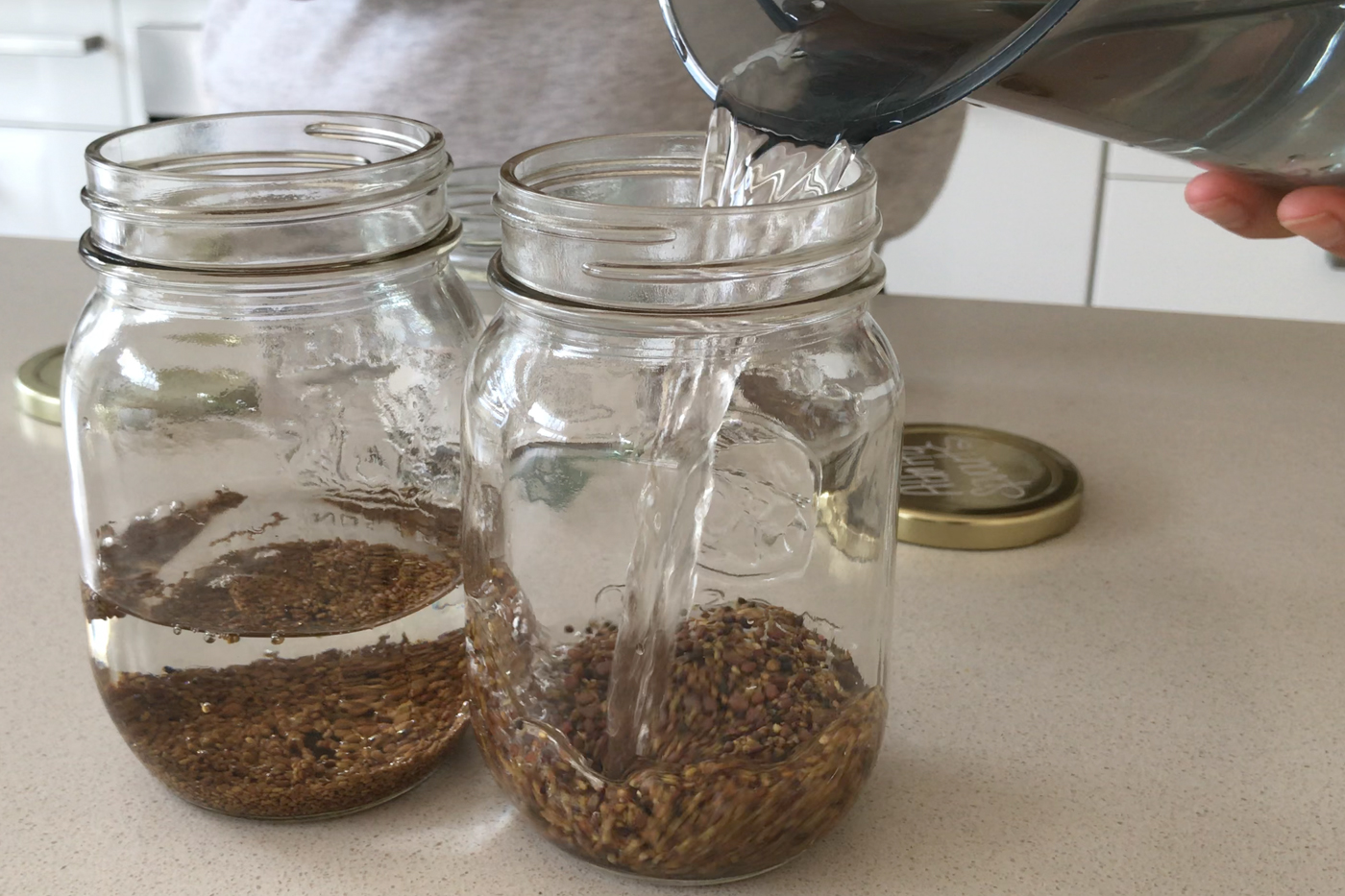By soaking your oats you neutralize the phytic acid. This soaking allows the beneficial enzymes to work and increases the number of vitamins and minerals present that your body will absorb. On the plus side, the process of rolling oats removes at least part of the bran, where a large portion of the phytic acid resides.

Somebody got this trend all wrong.
Well, not ALL wrong…but they messed up the only step in the recipe! We shouldn’t be soaking our overnight oats in the refrigerator, we should be soaking them with warm water, at room temperature—or even warmer. And would you believe that cooking the oats afterwards actually makes them even MORE nutritious. This is not a food you want to eat raw. Let me break down the basics for you…
Our ancestors ate whole grains after soaking them or fermenting them. Over time they figured out that this was how grains needed to be prepared—in order to avoid illness. It was probably thanks to serendipity that they figured this out back then because there weren’t any refrigerators…food was just left out. But as generations passed, and food culture diminished, we have been hastily preparing our grains…and we’ve even gone as far as thinking they are best uncooked! This is flat out wrong.
Did you know that the oatmeal box, back in the day, used to say “soak overnight” in the directions? What happened to that?
You see, all grains contain something called “phytic acid”—or phytates—in the outer layer or bran, and oats contain more phytates than almost any other grain. So, if this phytic acid is untreated, it will combine with important minerals in our body and block their absorption. I’m talking about calcium, magnesium, iron, zinc, and copper. We need these minerals, and our food supply is providing less and less of them because of modern farming methods. We should take every precaution to protect the minerals that are still available to us. Regular consumption of improperly prepared grains (also legumes, and nuts) can lead to mineral deficiencies, leaky gut, irritable bowel syndrome, bone loss, food allergies, and even mental illness…this is not only due to the phytic acid content, but more so a combination of these plant chemicals along with others like lectins, goitrogens, and oxalates to name a few. It’s the dose that makes the poison, and it varies widely from person-to-person (or gut-to-gut).
More Tips on Oats:
- Always buy ORGANIC Oats and any gluten-containing grains. This is imperative because science now shows that when the weed killer named Glyphosate is in the presence of Gluten (in our digestive tract) it passes through the intestinal wall. This will likely lead to immune responses, irritating symptoms, leaky gut, or a gluten intolerance. Take caution and only buy organic gluten grains.
- Always eat your oats and grains with a healthy fat like grass-fed butter, grass-fed cream, coconut milk, or coconut oil. The fats are necessary for us to absorb the fat-soluble vitamins in grains.
- Never buy your cracked or rolled oats in the bulk bin. You want them in a sealed package so the oils don’t go rancid and cause free radicals in the body.
- It’s highly recommended that you use a probiotic-rich liquid like whey (the liquid on top of your plain yogurt), buttermilk, whole-milk plain yogurt, whole-milk kefir, coconut kefir, when soaking your oats. This helps break down the phytic acid the most (and it also inhibits any harmful bacteria from growing). If you are completely against dairy, or don’t have any on hand, then you can try another acidic medium like lemon or apple cider vinegar, but you probably should be adding another gluten-free grain like buckwheat groats (not actually a grain, but it is Gluten Free) because it helps to break down phytic acid in those stubborn oats (more on this here). These soaking methods will encourage the beneficial bacteria, enzymatic release, and proper breakdown of those stingy phytates in grains. That is why you’ll see this recipe recommends adding up to 2 Tablespoons of such liquid while soaking.
The Health Benefits to Overnight Oats
FAQ
Is it OK not to soak oats?
Can you eat oats without soaking?
Why do you soak oats?
How long do oats need to soak?
Can you soak oats overnight?
It’s called soaking. Soaking your oats in water overnight can help break down the phytic acid, unlocking their full nutrient potential and making them easier on your gut. To soak oats, just add them to a mason jar or another glass container, add filtered water until they are fully submerged, and leave them overnight.
Is it healthy to eat dry oatmeal, no milk or water?
You can eat oatmeal without milk or water, but it’s probably unpleasant because it sticks in your mouth. If you don’t want to consume it with any liquid, you can consume it with fruits and even vegetables. But don’t forget to consume plenty of water throughout the day as the fibers present in oats will need water for digestion otherwise you may have intestinal problems and discomfort.
Should you cook or soak oats before eating?
Yes, it’s recommended for you to either cook or soak oats before consuming. Although raw oats can be eaten, it may cause digestibility issues, which is why it’s always preferred to soak oats. There are multiple benefits when you soak oats. For example, it softens the texture making the dry grain more palatable.
Why do oats need to soak in an acid overnight?
Oats need to soak in an acid overnight to break down anti-nutrients. Oats are very low in the enzyme phytase which is needed to break down phytic acid. So that’s why properly soaked oats must include something to add enough phytase, in my case I use buckwheat cereal.
